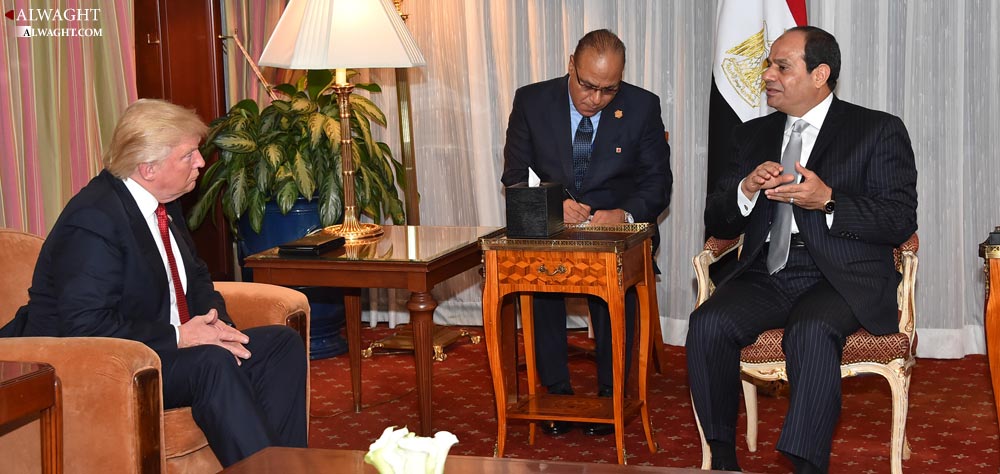Alwaght- In summer 2013, the Egyptian army staged a coup led by General Abdel Fattah el-Sisi, then the chief of general staff, against President Mohamed Morsi, the first ever democratically-elected president in the country’s political history. The military's power grab drew the US reaction. The White House, under Obama administration, was at that time an advocate of the Muslim Brotherhood (MB), the movement from which President Morsi rose to power. So removal of Morsi, who at the same time was leader of the MB, by the army mutineers did not appeal to Washington. As a result, the US suspended military contracts with Egypt under the excuse of consideration of the American laws that ban dealing with governments that seize the power on the strength of a military coup.
The suspension of the Washington’s military aids to Cairo made the el-Sisi government decline to develop warm relations with Washington in the past three years. The chilled ties with the US pushed the Egyptian leader to lean toward Russia to meet the country’s logistical needs. However, after Donald J. Trump won the presidential election in the country, the initial signs of change in the two sides' strained ties began to emerge.
Lashing out at the Obama’s pro-Muslim Brotherhood policies, Trump asserted that the US should assist el-Sisi as part of efforts to fight terrorism. According to the new American leader, having el-Sisi's back will double Washington's maneuvering power to confront the instability in Libya and obliterate terrorism, especially that Trump said he had no intention to intervene in Libya to restore political calm and order to this Egypt's neighbor.
In the Trump’s viewpoint, Egypt can shoulder the serious responsibility of rebuilding peace and security in the neighboring country. Such a responsibility might be accomplished well by strengthening Cairo militarily by the US, the new American administration thinks.
On the other side, the Obama administration left Cairo to its own devices, awakening el-Sisi’s inclinations to Russia. The new US president is well aware that if this US-Egypt gap continues existing, Washington will lose one of its oldest allies in the Arab world. This, combined with the Russian power of maneuvering in the Syrian developments, can mean setting up further restrictions ahead of the US West Asian policy.
Moreover, Egypt occupies an outstanding place in the White House’s strategy due to its geographical position in the region and its proximity to the Israeli regime. These facts push Trump into thinking that unhanding Egypt poses a major risk to the future of the US foreign policy in the region. In such circumstances, it is not accidental that Trump picked Egypt as first destination of his first West Asia tour as president of the US, as some news reports suggest.
The new American leader is optimistic that increased aids to el-Sisi will help the Americans take advantage of the Egyptian capabilities to materialize the campaign-time counterterrorism slogans. Supplying Egypt with military equipment also helps Trump manage the crisis in North Africa. This strategy is to offer a way to the US administration to offset marginalization of Washington in Syria.
On the other side, recent Egypt-Saudi Arabia tensions caused Cairo to lose one of its bankrollers and energy suppliers. When the Egyptian supreme court blocked el-Sisi’s decision to grant the two Egyptian Red Sea islands of Sanafir and Tiran to Saudi Arabia, the difference between Riyadh and Cairo set to rise even further. But the US closeness to Egypt amid an Egyptian-Saudi rift over the islands developed some concerns in the kingdom. The US can benefit of such concerns.
The Al Saud fears that Egypt may seize its position as the Arab world's leader and accordingly take its place in the US foreign policy agenda. Trump's stinging anti-Saudi criticism and the US declining to show any signs of joint plans with Saudi Arabia in the future even compounded the Saudi leaders' concerns. So it is predicted that the Saudis will take measures to cut Washington’s costs and provide the Western interests in a bid to buy Trump's approval. The Persian Gulf Arab states' boost of diplomatic ties with the Israeli regime and encouraging other Muslim countries to normalize relations with Tel Aviv are part of Saudi measures that seek making Trump contented with the kingdom.



























